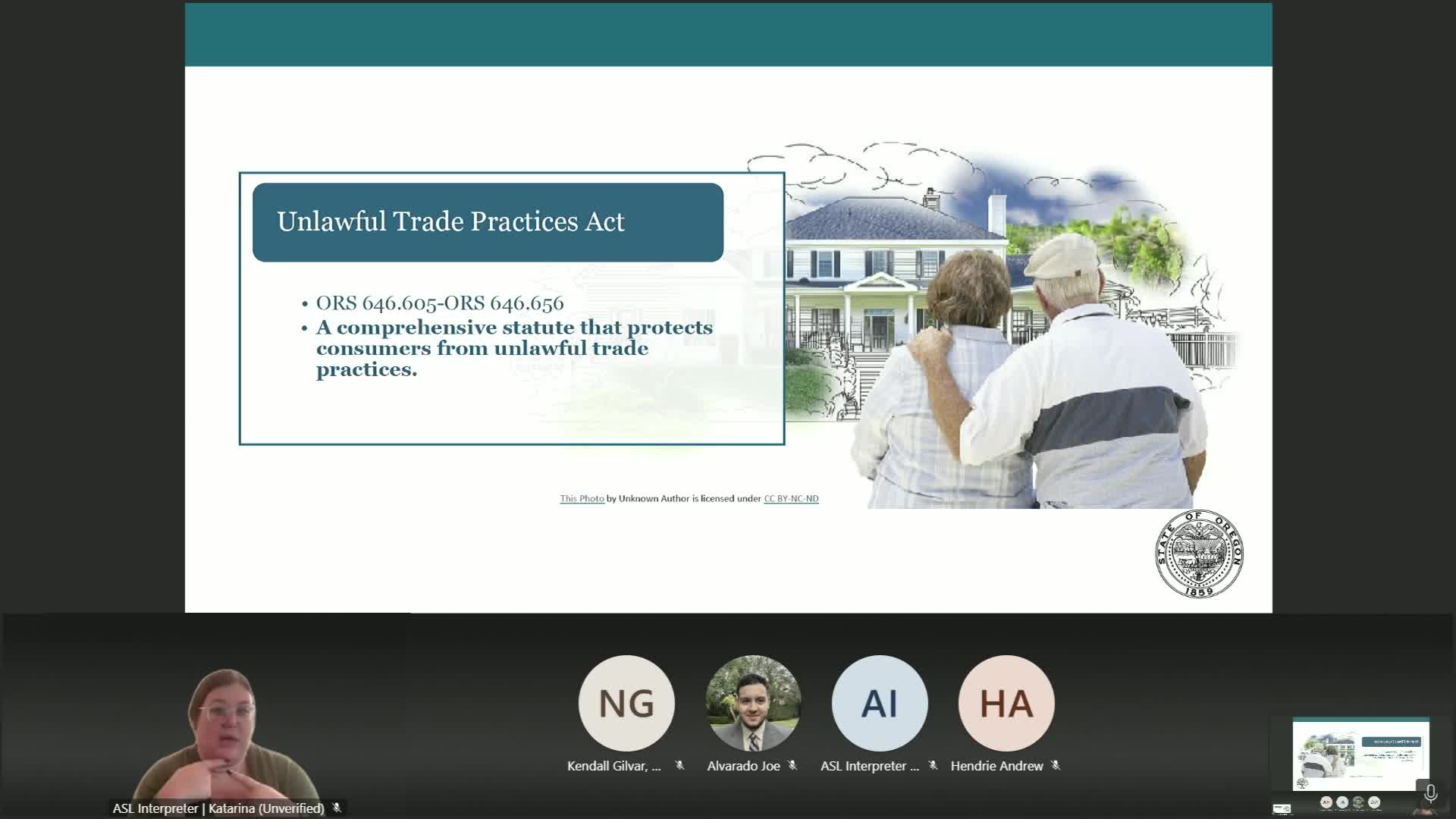Oregon DOJ outlines UTPA enforcement after MV Realty refunds; AG adviser cites $8 million returned to consumers
Get AI-powered insights, summaries, and transcripts
Subscribe
Summary
At a Nov. 18 informational hearing, Leslie Wu of the Oregon Department of Justice summarized how the Unlawful Trade Practices Act is used and described a recent MV Realty enforcement that the office says refunded nearly $8 million to 669 Oregonians affected by deceptive real-estate contracts.
Leslie Wu, policy advisor for Attorney General Dan Rayfield, told the House Interim Committee on Commerce to Consumer Protection on Nov. 18 that Oregon’s Unlawful Trade Practices Act (UTPA) is a primary tool for pursuing deceptive business practices and protecting consumers.
Wu opened with a recent enforcement narrative: a company she identified as MV Realty ran allegedly deceptive advertising campaigns and used lengthy, confusing contracts that, she said, left homeowners bound to the firm as a listing agent for decades. "We are refunding nearly $8,000,000 in value to 669 different Oregonians who were taken advantage of by this company," Wu said, describing restitution secured after the office’s UTPA inquiry.
The presentation explained the statute’s structure and who may enforce it. Wu said the UTPA (cited in her slides across ORS ranges she identified) establishes prohibited acts and defines key terms such as "in the course of a person’s business, vocation or occupation," "unconscionable tactics," and "real estate, goods or services." She noted the statute dates to 1971 and pointed to specific enforcement provisions committee members commonly see in cases.
Wu described the difference between private and public enforcement. For private litigants, she said, a plaintiff generally must show an ascertainable loss and a willful violation in certain circumstances; for public enforcement by the attorney general or a district attorney, she said the office can seek restitution, civil penalties, voluntary compliance agreements and injunctions and that the elements the state must prove can differ depending on the relief sought.
Wu cited past case examples to illustrate enforcement outcomes, including price-gouging prosecutions during the 2020 wildfires (she referenced ORS 401.965) and multistate actions against consumer product companies. In one consumer-product matter she discussed, she said Oregon’s portion of a multistate enforcement yielded approximately $18,800,000 in payments tied to UTPA violations.
Committee members asked detailed legal questions about who may be sued under the UTPA and what facts place private conduct "in the course of" a business. Wu told members courts generally look to whether the activity was part of a business, vocation or occupation, and she offered to follow up with citations and case law addressing frequency-of-sales and other thresholds.
Wu also flagged statutory carve-outs and conflicts-of-law rules that limit the UTPA’s reach, including exclusions for conduct covered by ORS chapter 90 (the Residential Landlord Tenant Act) and other defined carve-outs in the UTPA’s definitions. She offered to provide the committee with annotated statutory sources and press releases for the cases she described.
The informational hearing provided committee members a technical overview of how the attorney general’s office evaluates UTPA matters and illustrates the agency’s reliance on both litigation and behind-the-scenes compliance work to secure restitution for consumers. The committee did not take formal action at the hearing; Wu offered to supply further citations and documentation at members’ requests.
